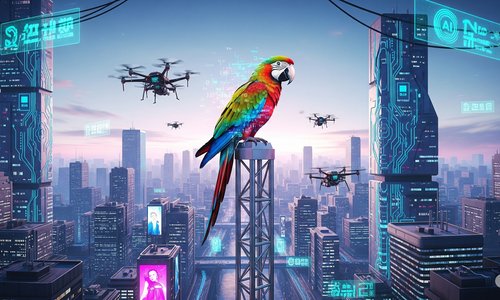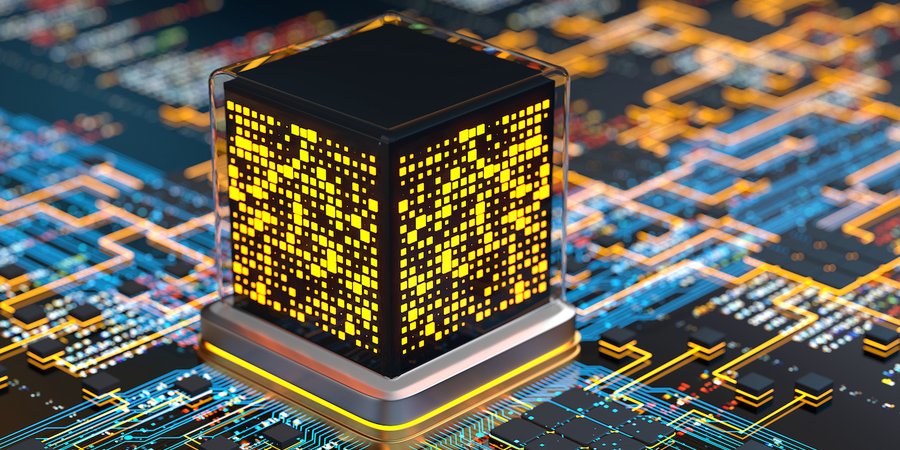
A Promessa e o Perigo da Nova Revolução Digital
A nova corrida tecnológica global levanta uma pergunta urgente: estamos prontos para confiar na inteligência que criamos?

Aprendizado de Máquina Quântico (QML)
Introdução
Em 1935, Einstein, juntamente com Boris Podolsky e Nathen Rosen, publicou um artigo para ilustrar o comportamento estranho da mecânica quântica, intitulando-o de "spooky action at a distance". Dentre as muitas peculiaridades, a noção de superposição quântica desafia nossa imaginação de forma significativa. Além disso, emaranhamento quântico torna-se ainda mais estranho, pois se alguém observa um sistema quântico, como dois elétrons, que estão em um estado emaranhado, pode-se medir a propriedade de um elétron, como sua rotação, e descobrir a rotação do outro elétron - sem sequer medi-lo. É bizarro ou surpreendente? Eu diria que são ambos.
Por outro lado, a área de aprendizado de máquina é um dos tópicos mais em alta na indústria e nos negócios atuais, com a maioria das empresas buscando integrar aplicações de aprendizado de máquina em seus processos de trabalho e ambientes. A demanda por essa tecnologia só aumenta e seu uso está se aprimorando a cada dia, com muitos cientistas e estudantes dedicando-se a pesquisas nessa área.
Muitos desses conceitos complexos parecem muito difíceis de entender no início, e são de tirar o fôlego para qualquer um. Posso relatar, por experiência própria, após mais de um ano de estudo, são necessárias inúmeras tentativas, experimentações e perseverança para entender os conceitos por trás da mecânica do aprendizado de máquina quântico. Mas, acho que sempre é melhor experimentar, especialmente no mundo quântico.
Este artigo discutirá o aprendizado de máquina quântico, que combina a computação quântica e o aprendizado de máquina. Vamos explorar seu funcionamento, aplicação e algumas das vantagens e desvantagens associadas a ele. Este artigo ajudará a entender esse novo tópico e planejar estratégias de aprendizado e aplicação adequadas.
Antes de prosseguirmos para a próxima seção, é importante lembrar as palavras de Amrita Manzari, Head de IA e Aprendizado de Máquina Quântico da QSI: "Comece devagar e depois dê um passo". Portanto, é importante seguir um passo de cada vez e, se necessário, ler e reler até fixar esse conhecimento fundamental.
O que é Computação Quântica?
A computação quântica é uma área de estudo que busca utilizar sistemas quânticos, como átomos e partículas subatômicas, para processar informações de forma mais rápida e eficiente do que os computadores clássicos. Os qubits, que podem representar simultaneamente os estados 0 e 1, permitem a execução de muitas tarefas simultaneamente, graças aos princípios da física quântica.
Uma ferramenta visual importante para compreender e trabalhar com qubits é a esfera de Bloch, que simboliza todas as possíveis combinações de valores de spin do qubit em um espaço tridimensional (FIgura 1). Cada estado quântico específico do qubit é representado por um ponto na esfera de Bloch, tornando a visualização mais fácil de seus estados e transições.
Figura 1 - Esfera de Bloch
Fonte: O Autor
Para ilustrar como a computação quântica funciona, podemos imaginar um jogo em que você precisa adivinhar a combinação de cores de um cofre. Em um computador clássico, você teria que tentar cada combinação de cores uma de cada vez, o que levaria muito tempo e esforço. Mas em um computador quântico, você poderia criar uma superposição de todas as combinações possíveis e testá-las em simultâneo, acelerando muito o processo de descobrir a combinação correta.
Portanto, a computação quântica tem potencial para revolucionar áreas como criptografia, simulação molecular e inteligência artificial, e já existem pesquisas em andamento para aprimorar a tecnologia. Entretanto, ainda há muitos desafios a serem superados antes que os computadores quânticos se tornem amplamente acessíveis e disponíveis.
Figura 2: Exemplo de um computador quântico (O computador quântico óptico chinês Jiuzhang 2.0 pode resolver um problema 1024 vezes mais rápido do que um computador clássico.)
Fonte: CHAO-YANG LU/UNIVERSITY OF SCIENCE AND TECHNOLOGY OF CHINA
Diferenças entre Programação Clássica e Aprendizado de Máquina
A programação tradicional e a aprendizagem de máquina são duas formas diferentes de resolver problemas. Na programação tradicional, um programador cria o programa, usando regras e lógica (Figura 3). É um processo manual. A aprendizagem de máquina, por outro lado, é automatizada. Usa dados de treinamento e teste, algoritmos para aprender padrões e funções de perda para testar precisão (Figura 4).
Uma das principais diferenças é como lidam com dados inesperados. Os programas tradicionais seguem instruções pré-definidas. Eles não conseguem lidar com dados que não foram previstos. Os algoritmos de aprendizagem de máquina, por outro lado, são capazes de se adaptar a novos dados.
Além disso, a programação tradicional usa dados para executar uma tarefa de forma lógica, enquanto a aprendizagem de máquina usa dados para prever padrões complexos em grandes conjuntos de dados.
Figura 3 - Programa Convencional
Fonte: Autor
Figura 4 - Programa de Aprendizado de Máquina
Fonte: Autor
Ambas têm vantagens e desvantagens. A programação tradicional é boa para tarefas simples, enquanto a aprendizagem de máquina é melhor para tarefas complexas. Mas a aprendizagem de máquina é mais difícil de entender e depurar, e precisa de muitos dados de treinamento.
Portanto, como pudemos constatar que o aprendizado de máquina é totalmente diferente da programação clássica, agora vamos na próxima seção comparar o aprendizado de máquina com o aprendizado de máquina quântico.
Aprendizado de Máquina Quântico?
Após termos adquirido conhecimentos sobre programação clássica, aprendizado de máquina e computação quântica, agora podemos explorar o campo da QML. A Figura 5 ilustra as áreas abrangidas pela QML, que é a combinação da computação quântica com o aprendizado de máquina.
Figura 5 - QT x ML
Fonte: Adapto pelo Autor [x]
O QML utiliza computadores quânticos para aprender de forma mais rápida e eficiente, permitindo o treinamento de modelos em conjuntos de dados maiores e mais complexos. Ele pode ajudar a resolver diversos tipos de tarefas, como reconhecimento de imagem e tradução de idiomas, além de processar grandes volumes de dados e solucionar problemas complexos.
Ao utilizar os conceitos de coerência, superposição e emaranhamento (serão apresentados em um próximo artigo), os computadores quânticos conseguem processar informações de maneira mais eficiente do que a computação clássica. Os algoritmos quânticos são procedimentos realizados em um computador quântico para solucionar um problema específico, como busca em bancos de dados, fatoração de números grandes e otimização, sendo esta última utilizada para acelerar algoritmos de aprendizado de máquina.
Na QML, os algoritmos quânticos são desenvolvidos para solucionar problemas típicos do aprendizado de máquina utilizando a eficiência da computação quântica. Isso pode ser feito adaptando algoritmos clássicos ou suas sub-rotinas para serem executados em um computador quântico.
Portanto, podemos concluir que as técnicas de aprendizado de máquina podem ser utilizadas para gerar processos quânticos e que conceitos de computação quântica podem ser aplicados para aprimorar algoritmos de aprendizado de máquina. Na próxima seção, exploraremos algumas das aplicações mais interessantes e promissoras da Computação Quântica.
Aplicações da Computação Quântica
Após passarmos por vários conceitos que eram necessários para entender a Computação Quântica e o Aprendizado de Máquina Quântico, iremos passar a tratar de suas aplicações, as quais têm o potencial de revolucionar diversas áreas. Como apresentado, a computação quântica é uma tecnologia emergente que utiliza princípios quânticos para processar informações de maneira muito mais rápida e eficiente do que os computadores clássicos.
Uma das principais aplicações da computação quântica é na criptografia, onde ela pode ser utilizada para desenvolver sistemas de segurança mais robustos e invioláveis. Isso se deve ao fato de que a criptografia quântica utiliza as propriedades da mecânica quântica para garantir a privacidade e a segurança das informações transmitidas.
Outra área em que a computação quântica pode ter um grande impacto é na inteligência artificial, uma vez que ela pode acelerar o processo de treinamento dos algoritmos de aprendizado de máquina, permitindo que as máquinas aprendam mais rapidamente e lidem com conjuntos de dados muito maiores do que é possível com os computadores convencionais. Isso acontece porque a computação quântica pode realizar cálculos exponencialmente mais rápidos do que a computação clássica, além de resolver problemas que são praticamente impossíveis para os computadores convencionais, como a fatoração de números primos grandes.
Destaca-se ainda o uso da computação quântica para otimização, área importante em diversas disciplinas como engenharia, física e finanças. A capacidade da computação quântica de resolver problemas de otimização de maneira mais eficiente do que a computação clássica é notável. Um exemplo é o algoritmo de Grover, que pode encontrar o mínimo de uma função quadrática em tempo sub-exponencial, o que se mostra útil em problemas de otimização.
Conclusão
Neste artigo, foi explorado como a computação quântica pode melhorar a aprendizagem de máquina, com impacto significativo em áreas como criptografia, inteligência artificial e otimização. No entanto, ainda há muitos obstáculos a superar antes que os computadores quânticos se tornem amplamente acessíveis. É crucial avançar com cautela e progresso gradual na adoção dessa tecnologia complexa. Cabe destacar que, a QML requer perseverança e experimentação, mas com tempo e dedicação, pode transformar as indústrias e negócios atuais, criando estratégias de aprendizado e aplicação inovadoras. Espero que tenham apreciado e compreendido o artigo e aguardo todos vocês no próximo.
Referências:
[1] CAMPBELL, Charlie. Quantum Computers Could Solve Countless Problems—And Create a Lot of New Ones, Time, 2023. Disponível em: https://time.com/6249784/quantum-computing-revolution/?utm_source=linkedin&utm_medium=social&utm_campaign=editorial&utm_term=tech_security&linkId=198703211. Acessado em 2 de março de 2023.
[2] MICROSOFT. What is quantum computing?. Disponível em: https://azure.microsoft.com/en-us/resources/cloud-computing-dictionary/what-is-quantum-computing/#introduction. Acessado em 1º de março de 2023.
[3] RESEARCH BRIEFS. Quantum Computing Vs. Classical Computing In One, 2021. Disponível em: https://www.cbinsights.com/research/quantum-computing-classical-computing-comparison-infographic/. Acessado em 1º de março de 2023.
[4] AREL, Ryan. Classical vs. quantum computing: What are the differences?, TechTarget, 2022. Disponível em: https://www.techtarget.com/searchdatacenter/tip/Classical-vs-quantum-computing-What-are-the-differences. Acessado em 2 de março de 2023.
[5] INSIGHTSOFWATER. Machine Learning vs. Traditional Programming, 2019. Disponível em: https://insightsoftware.com/blog/machine-learning-vs-traditional-programming/. Acessado em 2 de março de 2023.
[6] MANZARI, Amrita. Quantum Machine Learning: a roadmap for technologists, QSI. Disponível em: https://quantumstrategyinstitute.com/2022/02/28/quantum-machine-learning-a-roadmap-for-technologists/. Acessado em: 2 de março de 2023.
[7] SHARMA, Divyansh. Applications of Quantum Computing, AIM, 2022. Disponível em: https://www.analyticsvidhya.com/blog/2022/09/applications-of-quantum-computing/?utm_source=related_WP&utm_medium=https://www.analyticsvidhya.com/blog/2023/03/what-is-quantum-machine-learning/. Acesso em: 1º de março de 2023.
[8] NAYAK, Clethan. Microsoft has demonstrated the underlying physics required to create a new kind of qubit, Microsoft, 2022. DIsponível em: https://www.microsoft.com/en-us/research/blog/microsoft-has-demonstrated-the-underlying-physics-required-to-create-a-new-kind-of-qubit/. Acessado em: 2 de março de 2023.
[9] CHOI, Charles. Two of World’s Biggest Quantum Computers Made in China Quantum computers Zuchongzi and Jiuzhang 2.0 may both display "quantum primacy" over classical computers, IEEE Spectum, 2021. Disponível em: https://spectrum.ieee.org/quantum-computing-china. Acessado em: 2 de março de 2023.
Presidente da I2AI, Coordenador da Comissão de Tecnologia da Informação Quântica pela ABNT, Speaker, Pesquisador e Coronel do Exército Brasileiro. É um profissional extremamente qualificado e experiente em diferentes áreas. Possui mestrado em Governança, Tecnologia e Inovação, pela Universidade Católica de Brasília, bem como especializações em Ciências Militares, Bases Geo-Históricas, Engenharia de Sistemas, Ciência de Dados, Inteligência Artificial e Educação a Distância, além de vários MBAs, como em Administração Imobiliária, Gestão Pública Federal, Inteligência Artificial, Gestão de Projetos e Nova Lei de Licitações.
Além disso, é membro da Sociedade Brasileira de Computação, bem como do Grupo de Excelência em Processo Prospectivo e Construção de Cenários - CRA-SP.

A nova corrida tecnológica global levanta uma pergunta urgente: estamos prontos para confiar na inteligência que criamos?

Por que dominar a IA será a nova alfabetização do século XXI

Conselhos de Administração devem evoluir da supervisão reativa para a antecipação estratégica, frente à crescente complexidade e volatilidade dos ambientes de negócios.

De 14 a 25 de julho, reserve suas manhãs das 08h00 às 09h30 para participar da tradicional Maratona I2AI! Uma jornada intensa com debates e palestras sobre temas essenciais: Ética,